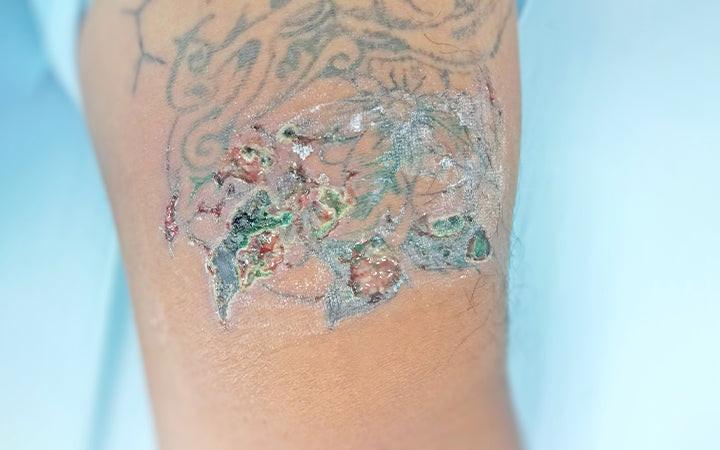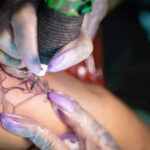Is your new tattoo driving you crazy with itchiness and bumps? At tattooat.com, we understand the concern. Itchy tattoos with bumps are often signs of skin irritation, allergic reactions, or even infection, but don’t worry, we’re here to help you navigate the healing process and identify potential issues; by understanding the causes and treatments, you can ensure your body art remains a source of pride, exploring related topics like tattoo aftercare, skin sensitivity, and ink composition.
1. What Causes My Tattoo To Itch and Have Bumps?
Itching and bumps on a tattoo can stem from various factors, including the body’s natural healing response, allergic reactions, infections, or pre-existing skin conditions. Understanding the root cause is crucial for effective treatment.
1.1. Normal Healing Process
Newly tattooed skin undergoes a healing process that often involves itching and the formation of small bumps. This is due to the skin regenerating and repairing itself after being punctured by the tattoo needle. According to dermatologists at the American Academy of Dermatology (AAD), this phase usually subsides within a couple of weeks with proper aftercare.
1.2. Allergic Reactions To Tattoo Ink
Allergic reactions to tattoo ink are a common cause of itching and bumps. Tattoo inks contain pigments made from various substances, and some individuals may be sensitive to these ingredients. Red ink is notorious for causing allergic reactions, but other colors can also trigger a response.
1.3. Tattoo Infections
Infections can occur if the tattoo is not properly cared for or if unsterile equipment is used. Bacteria can enter the skin through the open wound created by the tattoo needle, leading to infection. Symptoms may include redness, swelling, pain, pus, and small acne-like bumps around the tattoo area.
1.4. Skin Conditions Triggered by Tattooing
Tattooing can sometimes trigger or exacerbate pre-existing skin conditions like eczema, psoriasis, or dermatitis. The trauma to the skin can cause these conditions to flare up in or around the tattooed area.
1.5. Other Potential Causes
Other potential causes of itching and bumps on a tattoo include:
- Sun exposure: Sunburn can irritate the tattooed area and cause itching and bumps.
- Friction: Tight clothing or rubbing against the tattoo can cause irritation.
- Dry skin: Dry skin can exacerbate itching and make bumps more noticeable.
2. Identifying the Symptoms of Tattoo Problems
Recognizing the specific symptoms associated with tattoo itching and bumps is crucial for determining the underlying cause and seeking appropriate treatment.
2.1. Symptoms of Allergic Reaction
Allergic reactions to tattoo ink can manifest in various ways:
- Persistent itching: The itching is often intense and doesn’t subside with normal aftercare.
- Redness and swelling: The tattooed area may become red, swollen, and inflamed.
- Small, raised bumps: Tiny bumps, similar to hives, may appear on or around the tattoo.
- Skin rash: A widespread rash may develop around the tattoo.
2.2. Symptoms of Tattoo Infection
Infections typically present with more severe symptoms:
- Increased pain: The tattooed area may become increasingly painful and tender to the touch.
- Excessive redness and swelling: The redness and swelling are more pronounced than with a normal healing tattoo.
- Pus or drainage: Yellow or greenish pus may drain from the tattoo.
- Fever: In severe cases, a fever may accompany the infection.
- Bad odor: A foul odor may emanate from the tattooed area.
2.3. Symptoms of Skin Condition Flare-Up
If tattooing triggers a pre-existing skin condition, you may experience:
- Dry, flaky skin: The skin around the tattoo may become excessively dry and flaky.
- Thickened, raised patches: Patches of skin may become thickened and raised.
- Intense itching: The itching can be severe and persistent.
- Redness and inflammation: The skin may become red and inflamed.
2.4. Comprehensive Symptom Overview
| Symptom | Allergic Reaction | Infection | Skin Condition Flare-Up |
|---|---|---|---|
| Itching | Persistent, intense | Moderate to severe | Intense, persistent |
| Redness | Localized, may spread | Pronounced, spreading | Localized, may spread |
| Swelling | Mild to moderate | Significant | Mild to moderate |
| Bumps | Small, raised, hive-like | Acne-like, may contain pus | Dry, flaky, or thickened patches |
| Pain | Mild | Moderate to severe | Mild to moderate |
| Pus/Drainage | None | Yes, yellow or greenish | None |
| Fever | Rare | Possible | Rare |
| Odor | None | Possible, foul | None |
| Skin Appearance | Rash-like, may have hives | Inflamed, irritated | Dry, flaky, thickened |
| Onset | May appear shortly after tattoo or later | Usually within a few days | Varies depending on condition |
| Other Symptoms | General discomfort, possible skin sensitivity | Fatigue, body aches | Symptoms of underlying skin condition |
 Itchy Tattoo
Itchy Tattoo
Alt: A close-up of an infected tattoo showing redness, swelling, and pus-filled bumps indicating a severe skin reaction that requires immediate medical attention.
3. How Can I Treat Itchy Tattoo with Bumps?
Treating an itchy tattoo with bumps requires identifying the underlying cause and addressing it accordingly.
3.1. Home Remedies for Mild Irritation
For mild itching and irritation, try these home remedies:
- Cold compress: Apply a cold compress to the tattooed area for 15-20 minutes at a time to reduce itching and swelling.
- Moisturizer: Use a fragrance-free, hypoallergenic moisturizer to keep the skin hydrated.
- Loose clothing: Wear loose-fitting clothing to avoid friction and irritation.
3.2. Over-the-Counter Treatments
Several over-the-counter (OTC) treatments can help relieve itching and inflammation:
- Antihistamine creams: Topical antihistamine creams can help reduce itching.
- Hydrocortisone cream: A mild hydrocortisone cream can help reduce inflammation.
- Calamine lotion: Calamine lotion can help soothe itchy, irritated skin.
3.3. Medical Treatments for Infections
If you suspect an infection, seek medical attention immediately. A doctor may prescribe:
- Antibiotics: Oral or topical antibiotics can help clear up bacterial infections.
- Antifungal medications: Antifungal medications may be necessary for fungal infections.
- Wound care: The doctor may recommend specific wound care techniques to promote healing.
3.4. Medical Treatments for Allergic Reactions
For severe allergic reactions, a doctor may prescribe:
- Corticosteroids: Oral or topical corticosteroids can help reduce inflammation and itching.
- Antihistamines: Prescription-strength antihistamines can help relieve itching.
- Epinephrine: In rare cases of severe allergic reactions (anaphylaxis), an epinephrine injection may be necessary.
3.5. Treatments for Skin Condition Flare-Ups
Treating skin condition flare-ups typically involves:
- Topical corticosteroids: These can help reduce inflammation and itching.
- Emollients: Regular use of emollients can help keep the skin hydrated.
- Prescription medications: In some cases, a doctor may prescribe stronger medications to manage the skin condition.
4. Preventing Tattoo Problems
Prevention is always better than cure. By taking certain precautions, you can minimize the risk of itching and bumps on your tattoo.
4.1. Choosing a Reputable Tattoo Artist
Selecting a reputable tattoo artist is crucial for ensuring a safe and hygienic tattooing experience.
- Research: Read reviews and check the artist’s portfolio.
- Hygiene: Ensure the studio is clean and uses sterile equipment.
- Experience: Choose an artist with experience and a good reputation.
4.2. Proper Tattoo Aftercare
Proper aftercare is essential for preventing infections and promoting healing:
- Keep the tattoo clean: Wash the tattoo gently with a mild, fragrance-free soap and water.
- Apply moisturizer: Use a fragrance-free, hypoallergenic moisturizer to keep the skin hydrated.
- Avoid sun exposure: Protect the tattoo from the sun by wearing loose clothing or applying sunscreen.
- Avoid scratching: Resist the urge to scratch the tattoo.
- Follow the artist’s instructions: Adhere to the aftercare instructions provided by your tattoo artist.
4.3. Identifying and Avoiding Allergens
If you have known allergies, inform your tattoo artist and ask about the ingredients in the tattoo inks. Consider doing a patch test before getting a large tattoo.
4.4. Protecting Your Tattoo from the Sun
Sun exposure can damage your tattoo and cause irritation. Protect your tattoo by:
- Wearing loose clothing: Cover the tattoo with loose-fitting clothing when outdoors.
- Applying sunscreen: Use a high-SPF, broad-spectrum sunscreen on the tattoo.
- Avoiding tanning beds: Tanning beds can damage tattoos and increase the risk of skin cancer.
5. When Should I See A Doctor?
While many cases of itchy tattoos with bumps can be managed at home, it’s crucial to know when to seek professional medical advice.
5.1. Signs of Infection
If you experience any of the following signs of infection, see a doctor immediately:
- Increased pain and tenderness
- Excessive redness and swelling
- Pus or drainage
- Fever
- Bad odor
5.2. Signs of Severe Allergic Reaction
Seek immediate medical attention if you experience any of the following symptoms of a severe allergic reaction:
- Difficulty breathing
- Swelling of the face, lips, or tongue
- Hives
- Dizziness or lightheadedness
5.3. Persistent Symptoms
If your symptoms don’t improve with home remedies or OTC treatments, or if they worsen over time, consult a doctor.
5.4. Concerns About Skin Conditions
If you suspect that your tattoo is triggering a pre-existing skin condition, see a dermatologist for diagnosis and treatment.
6. The Importance of Professional Tattoo Aftercare Advice
While general guidelines for tattoo aftercare exist, it’s crucial to seek advice from your tattoo artist or a qualified healthcare professional.
6.1. Personalized Aftercare Instructions
Your tattoo artist can provide personalized aftercare instructions based on the size, location, and style of your tattoo.
6.2. Identifying Potential Problems
Your tattoo artist can help you identify potential problems early on and recommend appropriate treatment.
6.3. Ensuring Proper Healing
Following professional aftercare advice can help ensure that your tattoo heals properly and looks its best.
7. What Role Does Tattoo Ink Play?
The composition of tattoo ink can significantly impact the likelihood of adverse reactions, including itching and bumps.
7.1. Ink Composition
Tattoo inks contain pigments made from various substances, including metals, plastics, and dyes. Some of these substances can be allergenic or irritating to the skin.
7.2. Black Ink Concerns
Black ink may contain a high concentration of carbon black, which can sometimes cause allergic reactions.
7.3. Red Ink Risks
Red ink is notorious for causing allergic reactions due to the presence of mercury sulfide.
7.4. Alternative Ink Options
Consider discussing alternative ink options with your tattoo artist, such as hypoallergenic inks or inks made with natural pigments.
8. Long-Term Tattoo Care
Once your tattoo has healed, it’s important to continue caring for it to maintain its appearance and prevent future problems.
8.1. Sun Protection
Protect your tattoo from the sun by wearing loose clothing or applying sunscreen whenever you’re outdoors.
8.2. Moisturizing
Keep your skin hydrated by moisturizing regularly, especially after showering or swimming.
8.3. Avoiding Irritants
Avoid using harsh soaps, lotions, or other products that could irritate your tattoo.
9. Debunking Common Tattoo Myths
Many myths and misconceptions surround tattoos and their aftercare. Let’s debunk some of the most common ones:
9.1. Myth: All tattoos itch during healing.
While some itching is normal, excessive or persistent itching could be a sign of a problem.
9.2. Myth: You should pick at scabs on a tattoo.
Picking at scabs can damage the tattoo and increase the risk of infection.
9.3. Myth: Sunscreen is only necessary when the sun is strong.
Sunscreen is important even on cloudy days, as UV rays can still damage your tattoo.
9.4. Myth: You can use any moisturizer on a tattoo.
It’s important to use a fragrance-free, hypoallergenic moisturizer to avoid irritating the skin.
10. Discovering Tattoo Designs and Artists with Tattooat.com
Are you itching for a new tattoo but need inspiration? Tattooat.com is your ultimate resource!
10.1. Vast Design Library
Explore a diverse collection of tattoo designs, categorized by theme, style, and body placement, to spark your creativity.
10.2. Curated Artist Network
Find talented tattoo artists in the USA, including those in Portland, known for their exceptional skills and artistic vision. Our directory helps you connect with the perfect artist for your desired style.
10.3. Expert Guides and Information
Access comprehensive articles and guides on tattoo aftercare, ink allergies, and more, ensuring you’re well-informed about every aspect of the tattooing process.
Ready to bring your tattoo vision to life? Visit tattooat.com today and discover the perfect design, artist, and knowledge to make your next tattoo experience unforgettable!
Address: 1825 SW Broadway, Portland, OR 97201, United States.
Phone: +1 (503) 725-3000.
Website: tattooat.com.
Frequently Asked Questions
1. Why is my new tattoo so itchy?
Itchiness is a common symptom during the healing phase of a new tattoo. The skin is repairing itself, which can cause the release of histamine, leading to itching. However, if the itching is severe or accompanied by other symptoms like redness, swelling, or pus, it could indicate an infection or allergic reaction.
2. What kind of bumps are normal on a healing tattoo?
Small, raised bumps similar to goosebumps are normal during the healing process. These are typically caused by the skin regenerating and should subside within a few weeks. However, pus-filled or inflamed bumps could indicate an infection and require medical attention.
3. Can tattoo ink cause an allergic reaction years later?
Yes, it’s possible to develop an allergic reaction to tattoo ink even years after getting the tattoo. The immune system can sometimes become sensitized to the ink pigments over time, leading to a delayed allergic reaction.
4. How can I tell if my tattoo is infected?
Signs of an infected tattoo include increased pain, excessive redness and swelling, pus or drainage, fever, and a foul odor. If you experience any of these symptoms, see a doctor immediately.
5. Is it okay to scratch my itchy tattoo?
No, scratching an itchy tattoo is not recommended. Scratching can damage the skin, increase the risk of infection, and potentially ruin the tattoo’s appearance.
6. What should I put on my tattoo if it’s itchy?
Apply a fragrance-free, hypoallergenic moisturizer to keep the skin hydrated and relieve itching. You can also try applying a cold compress or using an over-the-counter antihistamine cream.
7. Can sun exposure cause my tattoo to itch?
Yes, sun exposure can irritate the tattooed area and cause itching. Protect your tattoo from the sun by wearing loose clothing or applying a high-SPF, broad-spectrum sunscreen.
8. How long does tattoo rash last?
A mild tattoo rash should clear up within a week or two with proper care. If the rash persists or worsens, see a doctor for further evaluation.
9. Can tattoos trigger eczema or psoriasis?
Yes, tattooing can sometimes trigger or exacerbate pre-existing skin conditions like eczema or psoriasis. The trauma to the skin can cause these conditions to flare up in or around the tattooed area.
10. What should I do if my tattoo is oozing fluid?
If your tattoo is oozing pus-like fluid, it could be a sign of an infection. See a doctor immediately for diagnosis and treatment.

